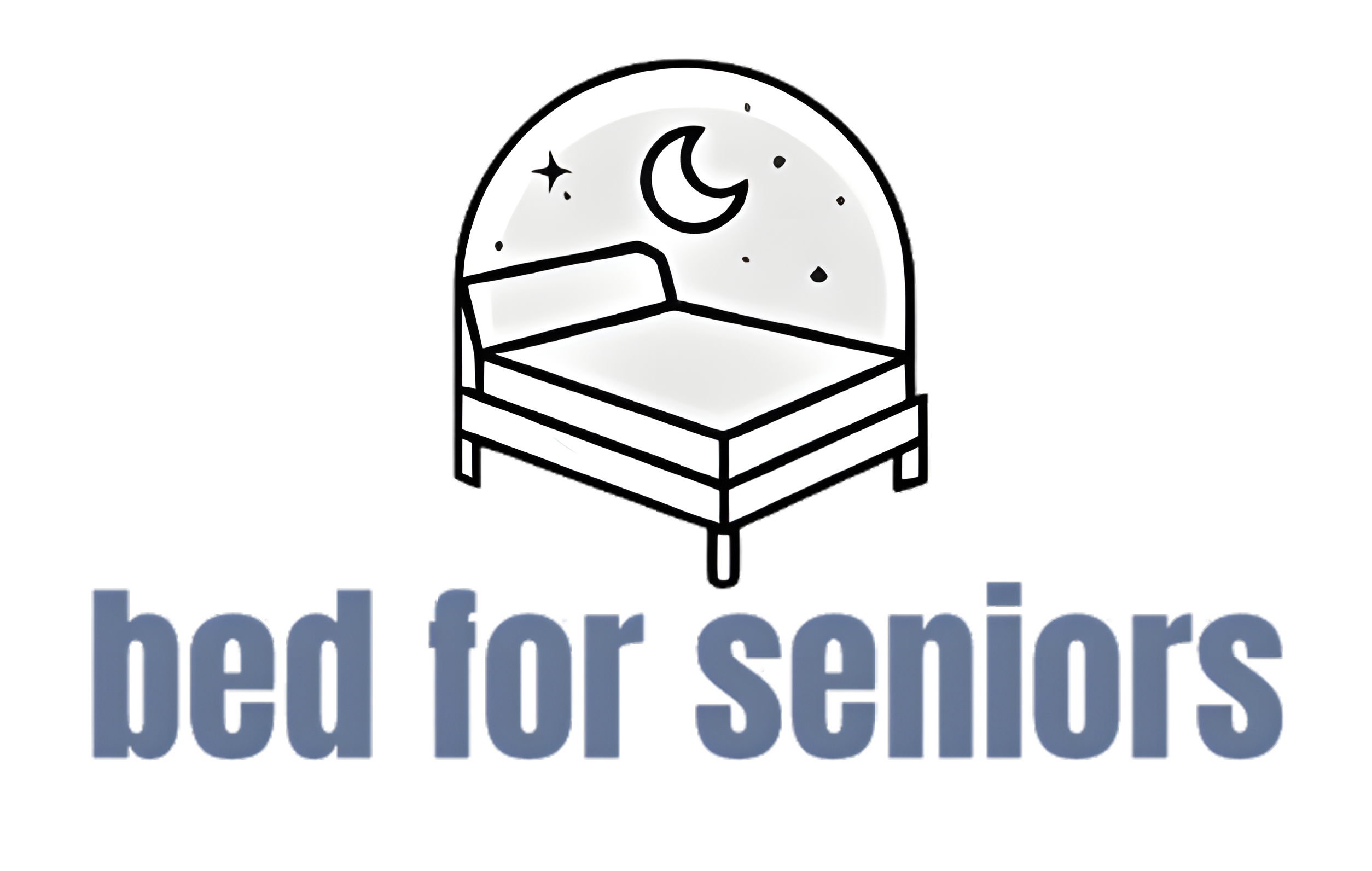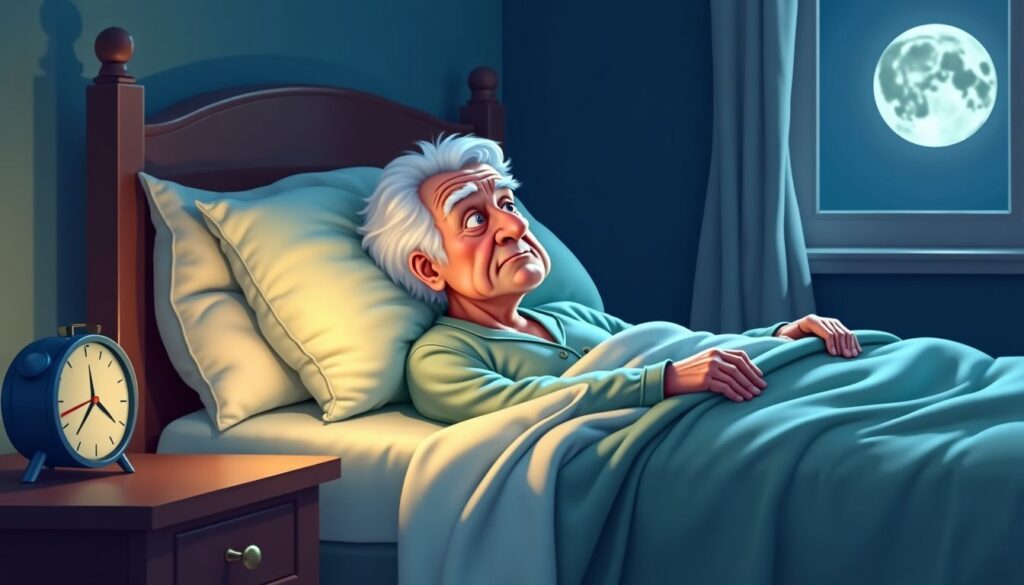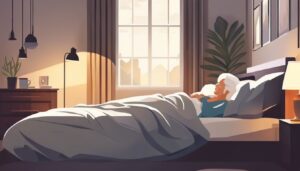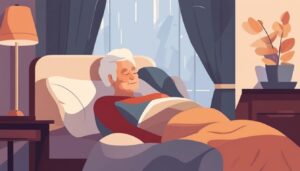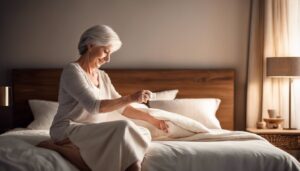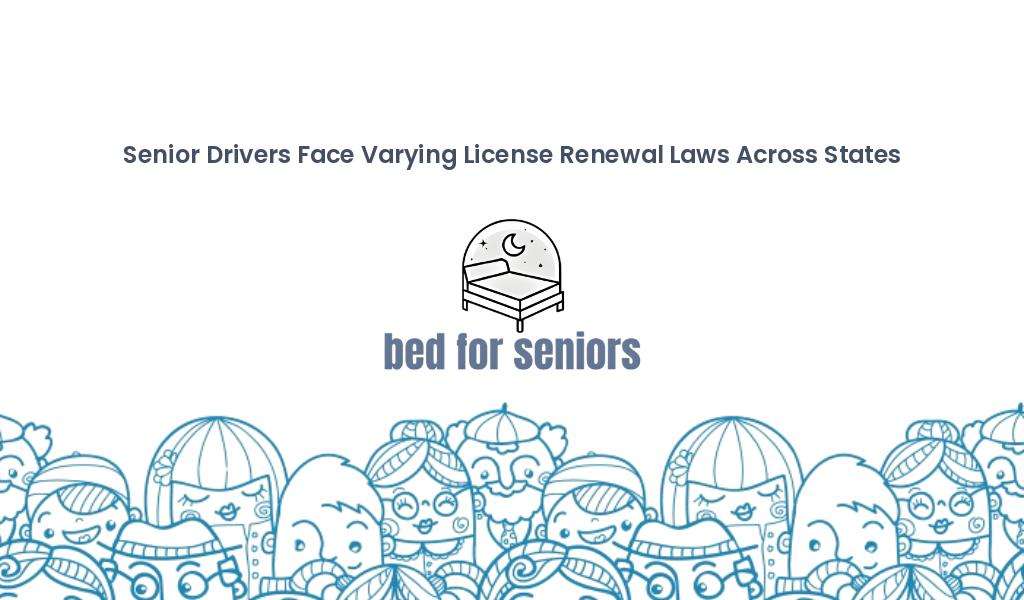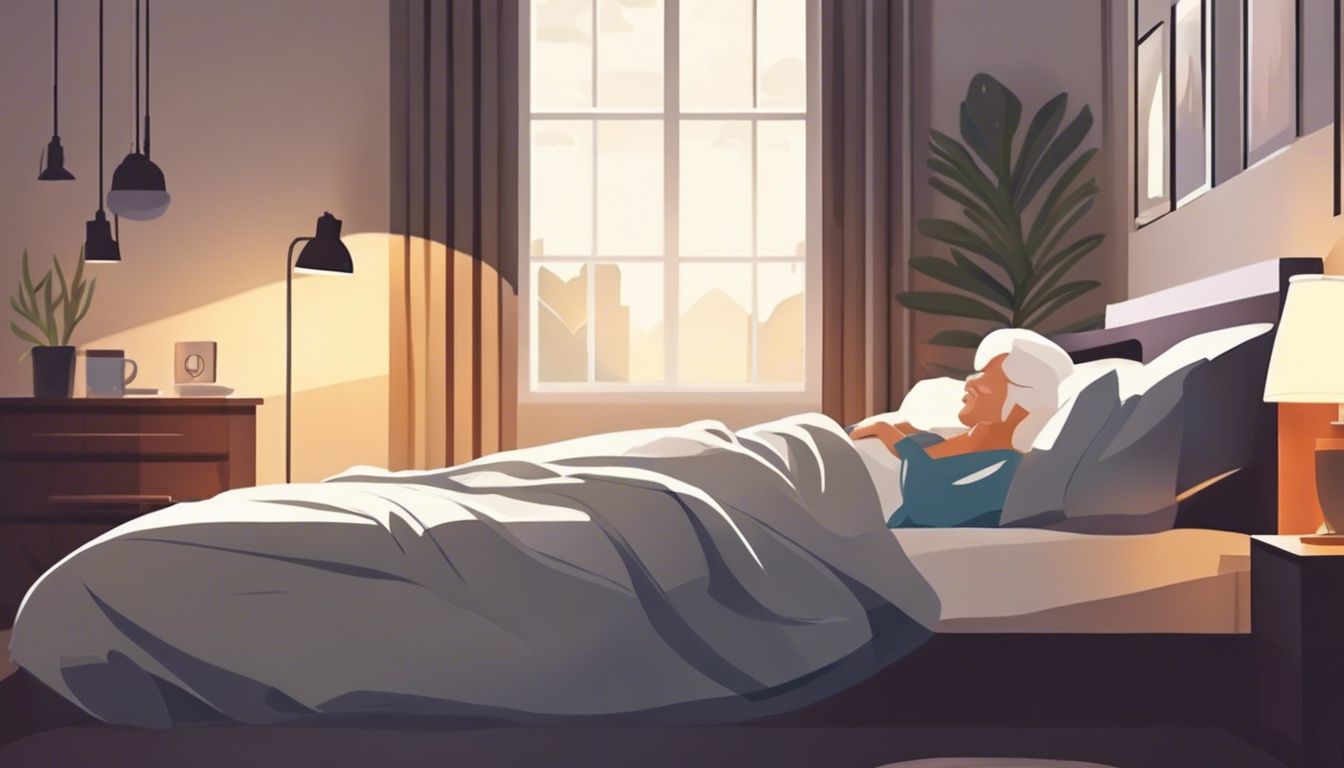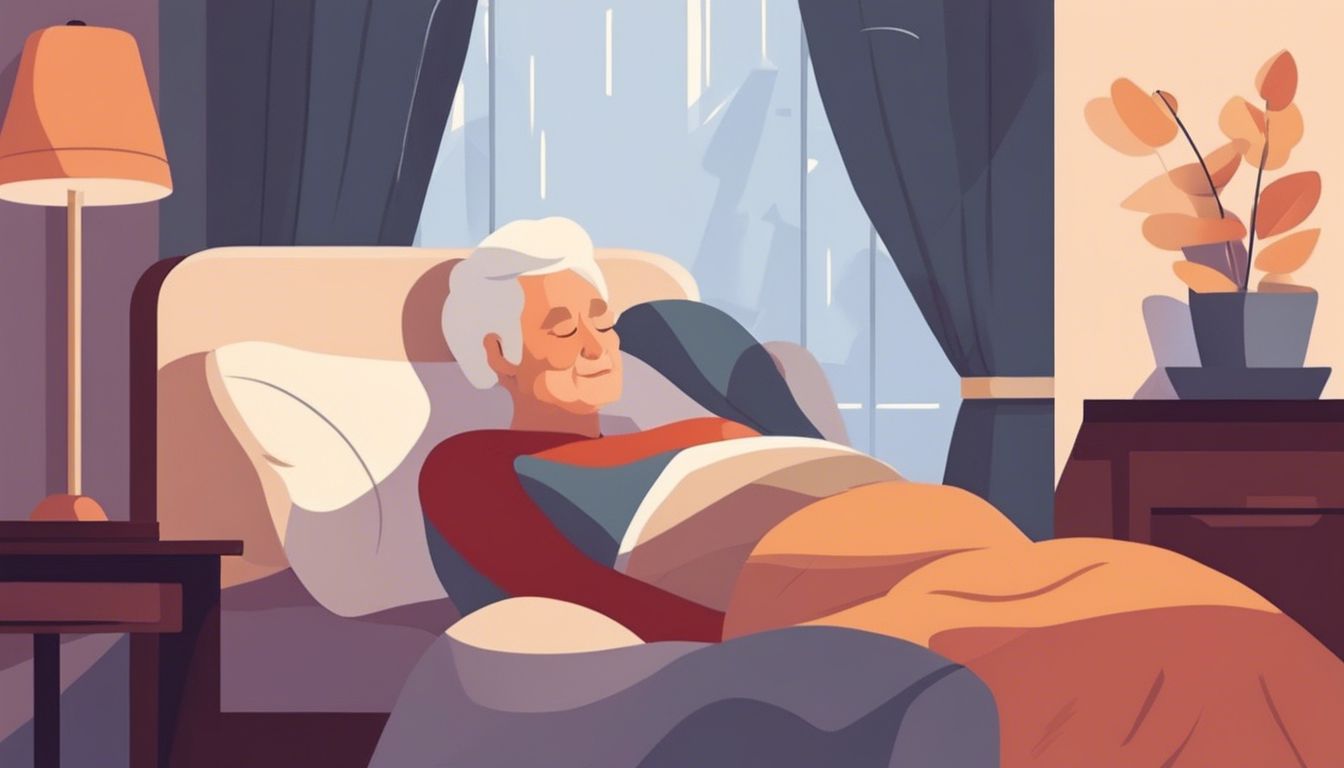Many elderly people find it hard to sleep well. Studies show we need 7-8 hours of sleep, but seniors often get less. This article explains why and offers ways to help them rest better.
Read on for tips.
Key Takeaways
- Many older adults struggle with sleep due to changes in their body clocks, health issues, and medications.
- Common sleep problems among seniors include insomnia, sleep apnea, restless legs syndrome, and periodic limb movement disorder.
- Bad habits like napping too much during the day or using electronics before bed can make it hard for them to get good rest at night.
- Doctors often recommend medical treatments along with lifestyle changes to improve sleep for elderly people. This includes setting a regular bedtime and avoiding caffeine before bed.
- Good sleep hygiene practices can help seniors achieve better quality of rest. This means keeping a consistent schedule and creating a comfortable sleeping environment.
Common Sleep Issues in Older Adults
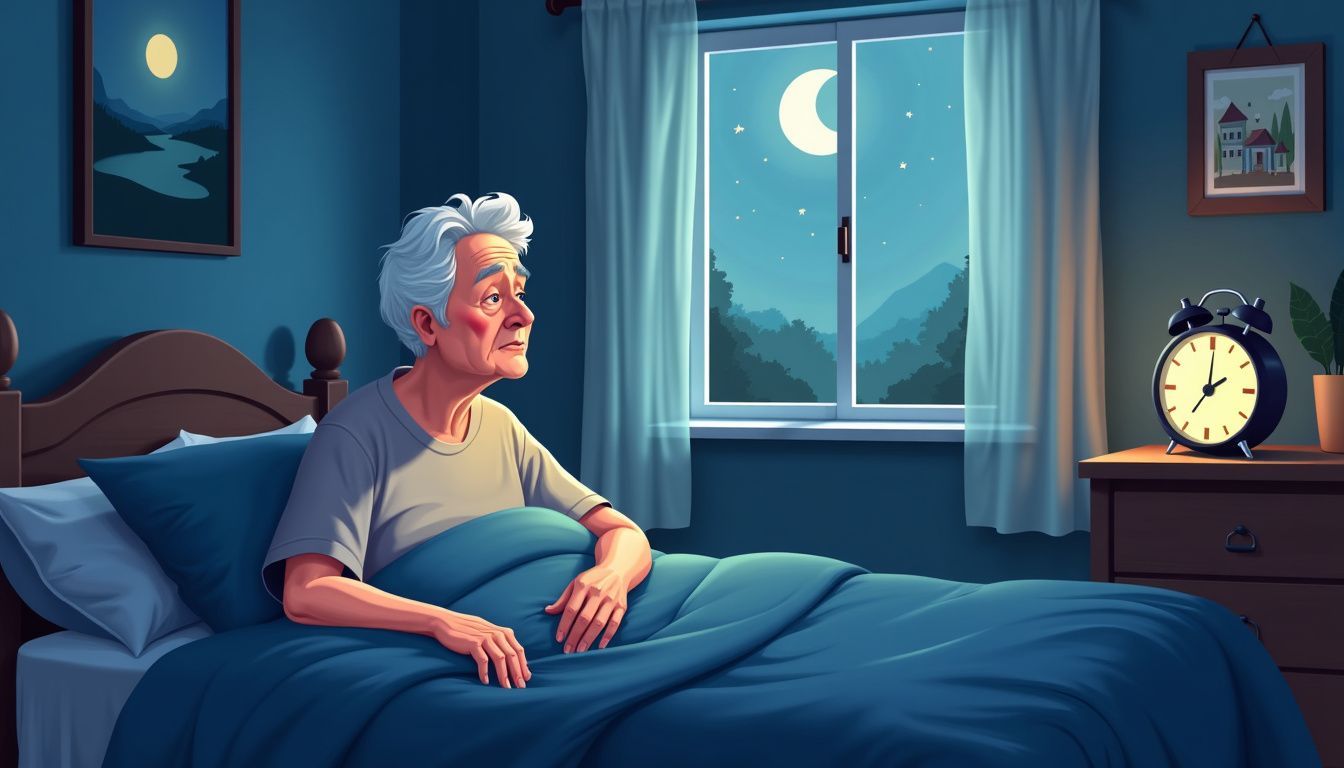
Older adults often face sleep troubles, including difficulty falling asleep and staying asleep through the night. This can lead to tiredness during the day and other health problems if not addressed.
Insomnia
Insomnia means having trouble with either falling asleep or staying asleep. It hits almost half of older adults—up to 48%. This problem can come from changes in their body clocks, not sticking to a regular bedtime, taking naps during the day, sleeping in a bad environment, and other reasons.
Good sleep habits are important for dealing with insomnia. These include setting a regular time to go to bed and wake up, avoiding caffeine before bedtime, and creating a comfortable sleep area.
Seniors should also try not to nap too much during the day so that they can sleep better at night.
Sleep Apnea
Sleep apnea is a common sleep disorder in aging people. It happens when breathing stops and starts during sleep. This can lead to snoring and tiredness during the day. In elderly, this problem often links to heart issues and high blood pressure.
Doctors may suggest using a device called continuous positive airway pressure (CPAP) machine at night. This device keeps the airway open, helping seniors breathe better when they sleep.
Making small changes like sleeping on one’s side can also help with symptoms of obstructive sleep apnea.
Restless Legs Syndrome
Moving from issues like sleep apnea, we find Restless Legs Syndrome (RLS) a common problem among elderly people. It makes them feel like they need to move their legs all the time. This can really disturb sleep patterns.
Older adults face this more often, especially if they have other health problems.
Risk factors for RLS include being older, having kidney failure, or not enough iron in the blood. Around one-third of older adults might have leg movements at night without realizing it.
These facts show how important it is to check on these signs and get help if needed.
Periodic Limb Movement Disorder
Shifting focus, Periodic Limb Movement Disorder (PLMD) is another common sleep issue older adults face. This condition involves sudden movements of limbs during sleep. Often, people with PLMD might not know they have it.
Their legs or arms twitch or kick throughout the night. These movements can disrupt their sleep and cause daytime tiredness.
Risk factors for this disorder include being older, having kidney problems, or low iron levels (serum ferritin level < 50 ng/mL). So, it’s crucial to keep an eye out for signs like constant leg movement at night or feeling extra sleepy during the day.
Taking steps early can help manage PLMD before it leads to bigger sleep disturbances.
Rapid Eye Movement Sleep Behavior Disorder
Rapid Eye Movement Sleep Behavior Disorder makes people act out dreams. They might talk, yell, or move a lot in sleep. It’s not common but happens more with age. This disorder can lead to falls or injuries.
Doctors use polysomnography to check for this problem. It tracks brain waves and body movements during sleep. Treatment may include medicine or changes in bedtime routine to keep everyone safe.
Factors Influencing Sleep Disruption in the Elderly
Sleep problems in older adults often come from health issues and their medicines. Things like heart disease, pain, and medications they take can make it hard for them to sleep well.
Medical Illnesses
Older people often face trouble sleeping due to medical conditions like heart failure or arthritis. These illnesses cause pain and discomfort, making it hard to sleep well. Conditions that affect the brain and nervous system also disrupt sleep.
For example, Alzheimer’s disease affects sleep patterns.
Taking care of someone with these problems means understanding how their health impacts rest. Knowing more about diseases and their effects on sleep can help caregivers find better ways to support seniors in getting good rest.
Medications
After looking at how medical illnesses affect sleep, it’s clear that medications also play a big part. Many types of medicines can mess with sleep. These include pills for colds, allergies, and even blood pressure.
The FDA says some sleeping aids must have warnings because they can cause problems like walking while asleep.
Drugs for feeling awake or down can change sleep too. Think about coffee drinks or antidepressants; they often lead to trouble falling asleep. It’s not just prescriptions, though. Over-the-counter stuff and supplements might make sleeping hard.
So, checking all the meds seniors take is key to help them rest better at night.
Psychiatric Disorders
Just like medications can disrupt sleep, so can psychiatric disorders. Mental conditions such as depression and anxiety are linked with insomnia. Bipolar disorder and thyroid problems also mess with sleep.
These issues make it hard for elderly people to fall asleep or stay asleep. They may feel very tired during the day but still can’t get good rest at night. It’s clear these mental health troubles impact their sleep a lot, adding to the list of things that mess up their rest patterns.
Poor Sleep Habits
Moving on from psychiatric disorders, let’s talk about poor sleep habits. They play a big role in sleep problems for the elderly. Going to bed at different times each night messes up their internal clock.
This makes it hard to fall asleep when they should. Napping during the day can also throw off nighttime sleep patterns.
Using electronics like TVs and phones in the bedroom is a bad idea too. The National Sleep Foundation says these devices make it harder to fall asleep. Keeping the bed just for sleeping or sexual activity helps train the body to know that bed means sleep time.
People who follow good sleep hygiene practices, like avoiding naps and keeping a regular bedtime, tend to have better quality sleep.
Aging and Sleep
As we get older, our sleep changes — circadian rhythms shift, and we don’t sleep as deeply. This makes sense if you think about the body’s internal clock adjusting. Want to learn how these changes affect us? Keep reading!
Changes in Circadian Rhythms
Older adults often sleep earlier. This happens because their body clocks change. Their circadian rhythms shift, making them tired early in the evening. It’s common and causes trouble sleeping at night.
These changes can lead to insomnia, or not being able to sleep well.
Light affects these rhythms too. Less light in the evening can make older people feel sleepy sooner. The body’s internal clock gets confused, making it hard to stay asleep all night.
Sleep quality goes down because of this mix-up.
Next, let’s talk about how less deep sleep affects seniors…
Reduction in Sleep Quality
After looking at how aging changes when people feel sleepy or awake, we see sleep quality declines too. Elderly folks catch less deep sleep and wake up more through the night. This means their sleep is broken into small parts, not giving them enough rest.
They spend shorter times in deep non-REM sleep, which helps refresh the brain. Because of this change, they might not feel well-rested in the morning. It’s sure – as people get older, their nights become less about solid rest and more about trying to find it again after waking up many times.
Decrease in Sleep Duration
Older adults often get less sleep at night. This leads to feeling tired during the day. They might nap more, but this can make nighttime sleep even harder. The body’s clock changes as people age, causing them to wake up early or not feel sleepy until late.
Doctors say seniors need 7-8 hours of sleep each night. But many don’t reach this goal. Reasons include health problems, taking certain medications, and stress. All these can cut down how much they sleep.
Also, conditions like restless legs syndrome or sleep apnea interrupt their rest, making it shorter and less refreshing.
How Much Sleep Do Seniors Need?
Seniors need 7 to 8 hours of sleep each night. This helps keep their mind sharp and their heart healthy. Some seniors might feel good with just 6 hours, but more often, they need at least 7.
As people age, sleeping becomes less deep and more broken up. So, it is key for them to aim for those full hours to get the rest they really need.
Next, we’ll talk about how lack of sleep can harm seniors’ health in big ways.
Health Risks Associated with Sleep Problems in Elderly
Sleep problems in the elderly can lead to serious health issues. They might face a higher chance of falling, experience brain function decline, or develop heart problems.
Increased Risk of Falls
Elderly people with sleep issues face a higher risk of falls. Sleep problems like insomnia or restless legs syndrome make it hard to stay balanced. They might feel drowsy during the day, losing their footing easily.
This danger grows if they use sleeping pills, which can worsen balance.
Falls lead to serious injuries such as broken bones. For seniors, this means longer recovery times and more health care needs. Good sleep habits help lower the chance of falls. Caregivers should watch for signs of poor sleep and take steps to make nights safer for the elderly.
Cognitive Decline
Sleep complications such as insomnia and sleep apnea disrupt the cognitive capabilities of the elderly population. Insufficient deep sleep hinders memory functions. Due to a lower melatonin level, the body’s internal rhythm is disrupted, which challenges cognitive abilities.
Both anxiety and illness contribute to sleep difficulties, which in turn impacts brain function. These problems can be mitigated with appropriate medical consultation and care.
Following sleep concerns, heart-related problems associated with poor sleep are also prominent amongst the elderly.
Cardiovascular Issues
Elderly people face more heart problems if they don’t sleep well. Bad sleep can lead to serious heart diseases because it affects how the heart works. People with conditions like insomnia and sleep-disordered breathing have a higher risk of these issues.
Also, if someone has heart failure, their sleep troubles can get worse, making their heart health decline even faster. It’s key for caregivers to talk with doctors about good sleep habits to protect against these risks.
Next up is managing sleep disorders in older adults…
Managing Sleep Disorders in the Elderly
Fixing sleep problems in older people can involve different steps, like seeing a doctor for health advice or trying ways to improve bedtime habits. Explore more to find out how you can help.
Medical Treatments
Doctors often help elderly people sleep better with different treatments. Here’s how they do it:
- They use sleep medicine carefully, knowing the FDA warns about strong side effects.
- For chronic insomnia, they might suggest cognitive behavioral therapy instead of drugs.
- Dealing with sleep apnea, doctors prescribe CPAP machines to keep airways open at night.
- Restless Legs Syndrome gets treated with medicines that adjust dopamine in the brain.
- Periodic Limb Movement Disorder may need drugs that relax muscles or control movements during sleep.
- Rapid Eye Movement Sleep Behavior Disorder requires medications that help control actions during dreams.
- Doctors advise against using sleeping pills for a long time due to risks of dependence.
- Lifestyle changes and sleep hygiene practices come before trying any sleep aids.
- Adjusting other medications can also improve sleep by reducing side effects that disturb it.
Each step aims for safer, more effective ways to tackle sleep issues without making them worse.
Lifestyle Adjustments
Elderly people often struggle with sleep. Making small changes can greatly improve their rest.
- Exercise daily, but finish any heavy activities at least three hours before bedtime. This helps keep the body calm and ready for sleep.
- Avoid big meals late at night. A light snack is better; it won’t disturb their sleep.
- Create a sleep-friendly environment in the bedroom. It should be dark, quiet, and cool to encourage deep sleep.
- Stick to a regular sleep schedule. Going to bed and waking up at the same time every day sets a natural rhythm for the body.
- Limit naps during the day, especially late in the afternoon, to ensure they’re tired enough for bedtime.
- Cut down on caffeine and alcohol intake as both can disrupt sleeping patterns.
- Encourage relaxing activities before bed like reading or listening to soft music instead of watching TV or using electronic devices that emit light.
- Use comfortable bedding that supports good sleep posture and temperature regulation throughout the night.
Next, let’s discuss how maintaining these habits contributes to overall well-being.
Sleep Hygiene Practices
After exploring lifestyle adjustments, we now focus on sleep hygiene practices. Good sleep habits can greatly help seniors get the rest they need.
- Set a consistent sleep-wake schedule. Go to bed and wake up at the same time each day, even on weekends.
- Create a bedtime ritual. Reading or listening to calm music can signal your body it’s time to sleep.
- Keep the bedroom dark, cool, and quiet. Use blackout curtains and a noise machine if needed.
- Invest in a comfortable mattress and pillows. Your bed should support a good night’s sleep.
- Limit daytime naps to 30 minutes. Long naps can make nighttime sleep harder.
- Avoid caffeine and nicotine 3-4 hours before bedtime. These stimulants can keep you awake.
- Stay away from heavy meals late at night. Light snacks are okay if you’re hungry.
- Get regular physical activity but not too close to bedtime – exercise earlier in the day is better.
- Limit fluids before bed to reduce nighttime trips to the bathroom.
- Make use of relaxation techniques like deep breathing or meditation to ease into sleep.
These practices aim for better night’s rest, improving overall health and reducing daytime tiredness for seniors.
Conclusion
Elderly people face sleep troubles due to body and routine changes. Aging alters the sleep cycle, making deep sleep hard to achieve. Common issues include insomnia and sleep apnea.
Factors like medicines, chronic illnesses, and bad sleep habits add to the problem. To manage these disorders, mixing medical treatments with lifestyle changes shows promise. This approach helps seniors get closer to the recommended 7-8 hours of restful night’s sleep they need for good health.
FAQs
1. Why do elderly people have trouble sleeping?
Elderly individuals may experience fragmented sleep due to changes in their sleep architecture, like more light sleep and less slow-wave sleep. Their total sleep time often decreases, leading to daytime sleepiness.
2. What causes insomnia in older adults?
Insomnia can be caused by a variety of factors including physical health issues such as chronic pain or cardiovascular disease, anxiety or worry, social isolation, and certain medications like antihypertensives and bronchodilators.
3. How does the aging process affect the stages of sleep?
The aging process can disrupt the normal patterns of REM and non-REM cycles which are crucial for restful slumber… The hypothalamus area that houses our biological clock – suprachiasmatic nucleus (SCN) – gets disrupted too!
4. Can lifestyle habits influence an elderly person’s quality of sleep?
Indeed! Lifestyle habits play a significant role… Disrupted routines akin to jet lag can mess with the regularity of one’s natural circadian rhythm or ‘sleep-wake cycle.’
5. Are there specific disorders related to disturbed sleeping patterns in seniors?
Yes! Sleep-wake disorders like REM Sleep Behavior Disorder are common among older adults… Other conditions include dementing disorders which could lead to difficulty staying awake during daytime hours…
6. What is recommended treatment for insomnia in elderly folks?
Treatment options range from maintaining a consistent bedtime routine—keeping a ‘sleep diary’ helps—to taking prescribed sedatives under medical supervision… Non-pharmacological alternatives might involve addressing underlying issues such as iron deficiency or making necessary lifestyle adjustments.
